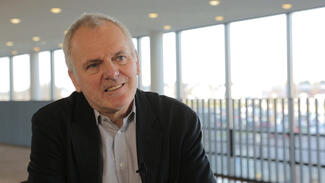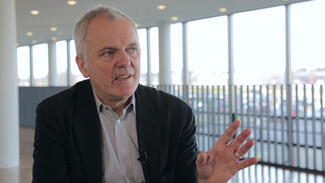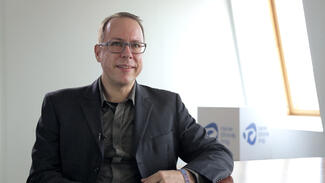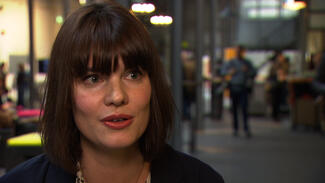
John Traxler: Digital World? A Permanent Beta-version!
"I don't think it's going to go away and it's not going to stop. We can't necessarily change much of it. But we've at least got recognized what it is."
Video abspielen
"When I'm in England CCTV security cameras take my picture 300 times a day", says John Traxler of Wolverhampton University. Many people have an uneasy feeling about new technology that allows intrusion and surveillance so well. It's time to face the ethical challenges of a digital age that is so fluid and chaotic. Can we manage that change?
"In England werde ich jeden Tag 3.000 Mal von Überwachungskameras registriert", sagt John Traxler, Professor an der Universität Wolverhampton (Großbritannien). Viele Menschen verspüren ein Unbehagen, weil sich die neue Technologie so gut zur Überwachung nutzen lässt. Höchste Zeit, sich den ethischen Herausforderungen des digitalen Zeitalters zu stellen, in dem so vieles in Fluss und chaotisch ist. Können wir diesen Wandel beherrschen?
Jede Woche neu beim Stifterverband:
Die Zukunftsmacher und ihre Visionen für Bildung und Ausbildung, Forschung und Technik
Autorin: Corina Niebuhr
Produktion: Webclip Medien Berlin
für den YouTube-Kanal des Stifterverbandes
Whenever there it's always in development. The world is now a kind of beta version, just that it's going to stay that way.
So if you look at the Arab spring, for example in Egypt, and you know, three years, four years down the line the Arab spring isn't what it started out as but if you look at just the presentation of the Arab spring it was about the static structures of government, the static structures of political organisation, the hierarchies of political organisation, especially in Egypt being challenged by the people at the bottom. You know, individuals with mobile devices, with connections, and you can look at, even for 15 or 18 years back to political unrest in the Philippines, how mobile devices have been used as a catalyst in political change. I wrote an article about an Arab spring of education where you look at the static institutions, the static professions, the static curriculum. And then on the other hand the fluidity or the mobility of just everyone or everyone else creating their own organisations and very, very fluid. A Finnish researcher has talked about wildfire, just like kind of information-communication networks just springing up and springing down, just phew ... Or has talked about a kind of bird migration as another metaphor for the kind of social change that we might be seeing in ways that, you said manage, actually that we can't manage. And maybe we just have to get used to it. Maybe we just have to get used to feeling uncomfortable or uneasy. But then that begins to take you to a kind of postmodern argument about this is the end of the enlightenment. This is what we started in 1789 with the French Revolution thinking that our brains will organise everything for us, and everything would be simple and we could figure out what was cause and what was effect and what was good and what was bad. All of a sudden it's a much more fluid and chaotic world. A Polish sociologist talks about liquid maternity, kind of meaning everyting is fluid and everything is changing. Computer scientists would probably say permanent beta.
In terms of the established press, Ministry of Information, BBC on the one hand, you know, the old world, and then on the other hand you have citizen journalism. People using cameraphones and sharing on Facebook to generate their own news coverage, and clearly there's a myth or a mythology that that's now democratic. Of course it's not democratic. They are using the technologies of American corporations. They are using Google, and they are using YouTube. But there is still a powerful myth that we are moving from a world controlled by Rupert Murdoch, youn know, News International or the Ministry of Information, to a world where people make and share their own news. Like I say, if you look slightly more deeply, it's not true. It's being controlled by, like I say, Google. Nevertheless, it's a anew way of producing and consuming and transforming and sharing news.
I don't think the BBC produced the truth but I don't think any particular government's Ministry of Information produces the truth. They may produce a consensus, or they may represent a consensus. They may actually represent the views of rich or powerful people or rich or powerful classes, and maybe Google represents the technology of a different rich and powerful class that now lives in Silicon Valley, not in central London. And it may be that what we are calling the democratic or demotic social media are just a way of surfacing some of the views that the old ways of doing things would have surpressed or would have called subversive. I can have a picture of bombings in central London taken by people with their cameraphones, and the conventional truth from the BBC would have been that that was a terrorist outrage. But actually there are other truths that are on offer. And so there is a different truth maybe saying that this is jihadist revenge, you know, this is divinely ordained, this is the path of the warrior. That truth, so-called truth, is not the one that would have got any visibility through the BBC. They would be telling a story about brave Londoners, victims, but someone else would be representing them as part of an oppressive western capitalist system.
You mentioned trust as a way of making decisions about what we choose to believe and who we choose to believe and whether those sources are maybe face to face or online doesn't ma e a dramatic difference but we obviously got some skill about trust in face to face relationships, and not just trust but authority or loyalty or laziness, any of those might be the reason why we believe what people tell us face to face. And any of those reasons, loyalty, laziness, authority or trust might be the reasons why we believe what we consume in online media just that again the sudden change in technology, its power and availibility means we are not used to it, we haven't adjusted to it. And this conversation in 50 years time, when people go into your archives in 50 years time they might wonder what really was the problem.
Certainly there is a comprehensive but creeping view about how the technology allows intrusion and surveillance, and the fact that Google Analytics can tell us so many different things on how we behave online or how we behave when we are learning is probably only part of the same picture that aso says: When I'm in England CCTV security cameras take my picture 300 times a day. Or when I'm in Palestine the Israeli security services are listening to my telephone conversations. Again, I guess it's all part of a world which we need the skills and the confidence to get to grip with. I don't think it's going to go away and it's not going to stop. We can't necessarily change much of it. But we've at least got recognized what it is.
When we consider, when we think about learning analytics there is a lot of conversation about privacy and confidentiality, and I think that debate is a good debate and is fairly mature. People have noticed that there are ethical dimensions to learning analytics. And I think probably thenext step should be thinking about the ways in which the learners can be part of those conversations. Maybe it could be used in better ways to improve what you might call their meta cognition. So they can understand more about their learning. So they can learn about their learning. And so they can learn about the choices they make in their learning, who should they learn with and what should they learn and when should they learn and what has worked for them in the past. So I think it is neutral, there are a lot of possibilities and a lot of opportunities but we need to bring everyone in and explain all of those opportunities and maybesome of the challenges and problems as well.
Weitere Videos zum Thema


